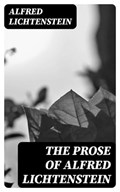In "The Prose of Alfred Lichtenstein," readers are invited into a sophisticated exploration of early 20th-century sensibilities through Lichtenstein's innovative narrative style. The collection presents a series of vignettes that dissect the complexities of urban life, synthesizing the philosophical undercurrents of expressionism with a distinctly modernist flair. Lichtenstein's prose is characterized by its vivid imagery and psychological depth, poised at the intersection of personal introspection and the social upheavals of pre-World War I Germany. This book exemplifies a pivotal moment in literary history, illustrating the shift from Romantic ideals to the stark realities of modern existence. Alfred Lichtenstein, a figure often overshadowed by his contemporaries, was deeply immersed in the avant-garde literary movements of his time. Born in 1889 in Berlin, his experiences living in an increasingly tumultuous society profoundly shaped his writing. Lichtenstein's involvement in the Berlin Dada movement and his friendships with artists and writers of the time provide crucial context for his work, revealing his dedication to pushing against traditional literary boundaries. For those interested in the evolution of modern literature, "The Prose of Alfred Lichtenstein" is an essential read. It illuminates the psychological and social intricacies of its era, offering both historical insight and a refreshing literary experience. Lichtenstein's work stands as a testament to the power of prose to capture the fleeting nature of human experience amid the chaos of modernity.

